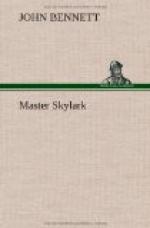“And yet when I would fill this silly fellow’s jerkin full of good gold Harry shovel-boards for the simple drawing of his breath, ye bawl ‘Foul play!’”
“What, here! come out, lad,” roared the smith, with a great horse-laugh, swinging Nick forward and thwacking him jovially between the shoulders with his brawny hand; “come out, and go along o’ the master here,—’tis for thy good,—and ho-ome wull keep, I trow, till thou dost come again.”
But Nick hung back, and clung to the blacksmith’s grimy arm, crying in despair: “I will na—oh, I will na!”
“Tut, tut!” cried Master Carew. “Come, Nicholas; I mean thee well, I’ll speak thee fair, and I’ll treat thee true”—and he smiled so frankly that even Nick’s doubts almost wavered. “Come, I’ll swear it on my hilt,” said he.
The smith’s brow clouded. “Nay,” said he; “we’ll no swearing by hilts or by holies here; the bailiff will na have it, sir.”
“Good! then upon mine honour as an Englishman!” cried Carew. “What, how, bullies? Upon mine honour as an Englishman!—how is it? Here we be, all Englishmen together!” and he clapped his hand to Will Hostler’s shoulder, whereat Will stood up very straight and looked around, as if all at once he were somebody instead of somewhat less than nobody at all of any consequence. “What!—ye are all for fair play?—and I am for fair play, and good Master Smith, with his beautiful shoe, here, is for fair play! Why, sirs, my bullies, we are all for fair play; and what more can a man ask than good, downright English fair play? Nothing, say I. Fair play first, last, and all the time!” and he waved his hand. “Hurrah for downright English fair play!”
“Hurrah, hurrah!” bellowed the crowd, swept along like bubbles in a flood. “Fair play, says we—English fair play—hurrah!” And those inside waved their hands, and those that were outside tossed up their caps, in sheer delight of good fair play.
“Hurrah, my bullies! That’s the cry!” said Carew, in his hail-fellow-well-met, royal way. “Why, we’re the very best of fellows, and the very fastest friends! Come, all to the old Three Lions inn, and douse a can of brown March brew at my expense. To the Queen, to good fair play, and to all the fine fellows in Albans town!”
And what did the crowd do but raise a shout, like a parcel of school-boys loosed for a holiday, and troop off to the Three Lions inn at Master Carew’s heels, Will Hostler and the brawny smith bringing up the rear with Nick between them, hand to collar, half forgotten by the rest, and his heart too low for further grief.
And while the crowd were still roaring over their tankards and cheering good fair play, Master Gaston Carew up with his prisoner into the saddle, and, mounting himself, with the bandy-legged man grinning opposite, shook the dust of old St. Albans from his horse’s heels.
“Now, Nicholas Attwood,” said he, grimly, as they galloped away, “hark ’e well to what I have to say, and do not let it slip thy mind. I am willed to take thee to London town—dost mark me?—and to London town thou shalt go, warm or cold. By the whistle of the Lord High Admiral, I mean just what I say! So thou mayst take thy choice.”




